EU COURT UPHOLDS BAN ON RUSSIAN BROADCASTER

On 27 July, the Grand Chamber of the General Court of Justice of the EU rejected an appeal filed by the Russian state-controlled media Russia Today France (RT France) against the ban on its content, following the outbreak of war in Ukraine. The Kremlin subsequently denounced the decision as “extremely negative” and threatened similar retaliatory measures against Western media.
This is the first ruling given by the Grand Chamber under the expedited procedure, by which a judgment or a preliminary ruling can be given more quickly than under the normal procedure for a judgment or a preliminary ruling.
The Russian invasion of Ukraine on 24 February immediately gave rise to extensive media coverage, with the deployment of ad hoc formats, such as live broadcasts organised by a number of online media outlets to follow the invasion’s developments and its many consequences.
Among these consequences is an unprecedented media event on a European scale: the European Union’s ban on the Russian television channel Russia Today (RT) and the Sputnik agency from continuing to broadcast their programmes and information in the Community space.
This decision, announced on 27 February, took effect on 2 March with its entry in the EU Official Journal, and quickly gave rise to a multi-media soap opera which was itself prolonged with the announcement by RT on 8 March that it was challenging the decision.
The EU imposed the ban a week after the start of Russia’s invasion of Ukraine, citing the systematic dissemination of false information about the operation.
The president of the European Commission, Ursula von der Leyen said at the time, “We will ban the Kremlin’s media machine in the EU. The state-owned Russia Today and Sputnik, and their subsidiaries will no longer be able to spread their lies to justify Putin’s war.”
And the Luxembourg-based Court of Justice declared that the Grand Chamber of the Court of First Instance rejects RT France’s request to annul the Council’s acts, adopted following the outbreak of war in Ukraine, temporarily banning it from broadcasting content.
The General Court found that, bearing in mind the extraordinary context of the case, the circumstances were sufficient to establish that the limitations on RT France’s freedom of expression which the restrictive measures at issue are liable to have “are proportionate, inasmuch as they are appropriate and necessary to the aims pursued”.
The Court also found that those measures “do not disproportionately infringe the essential content of RT France’s freedom to conduct a business” since they are temporary and reversible.
Finally, in so far as the alleged infringement of the “principle of non-discrimination on grounds of nationality” are concerned, the General Court observed that the difference in treatment on which RT France relied did not fall within the scope of the Charter of Fundamental Rights of the European Union, and besides, RT France failed to identify any other category of persons who would have been treated more favourably when in a situation comparable to its own, namely being under the direct or indirect control of the leadership of the Russian Federation.
The EU sanctions apply to RT’s English unit and its operations in Britain, Germany, France and Spain, and mean that RT’s content cannot be broadcast by EU operators.
The ban includes the suspension of RT’s broadcast licences and authorisation, transmission and distribution agreements with its European counterparts.
RT France can appeal on questions of law to the Court of Justice of the European Union, the EU’s highest court.
James Lookwood
UKRAINE: THE EU HAS COORDINATED THE DELIVERY OF MORE THAN 60,000 TONNES OF LIFE-SAVING ASSISTANCE

As of mid August, the EU has coordinated the delivery of 66,224 tonnes of in-kind assistance to Ukraine from 30 countries via the EU Civil Protection Mechanism. The assistance delivered includes 180 ambulances, 125 fire-fighting vehicles, 300 power generators, 35 heavy machinery vehicles, and 4 pontoon bridges. This is by far the largest, longest lasting and most complex operation via the EU Civil Protection Mechanism since it was established in 2001, with an estimated value so far of over €425 million. To support this operation, logistics hubs have been set up in Poland, Romania and Slovakia where assistance is then chanelled directly to Ukraine.
Commissioner for Crisis Management, Janez Lenarčič said: “We are all horrified by Russia’s atrocities in Ukraine. By providing emergency assistance, we can at least ease the immense pressure on Ukraine’s emergency response systems. Today we have reached an important milestone – over 60,000 tonnes of in-kind assistance coordinated via the EU Civil Protection Mechanism has arrived in Ukraine. I am extremely grateful to every single Member State, together with Norway, Turkey and North Macedonia for having offered help that we have then channelled most effectively through the Mechanism. This solidarity is the proof that the EU is with Ukraine not only in words but in actions.”
On 15 February, Ukraine activated the EU Civil Protection Mechanism in preparation for a large-scale emergency. Ever since, the EU Emergency Response Coordination Centre has maintained close contact with the Ukrainian authorities to determine the specific needs, and to coordinate the EU’s crisis response.
The EU continues receiving new offers to Ukraine from its Member States still today. The latest offers via the Mechanism include, hospital beds and hygiene kits from Austria, an ambulance and medical equipment from Norway, shelter equipment from Finland, Protective personal equipment from Germany, medicines from Czechia and Slovakia, power generators from Italy and energy supply equipment from France.
The EU’s Emergency Response Coordination Centre is operating 24/7 to provide further assistance based on the specific needs indicated by Ukraine.
Background
Since the start of Russia’s invasion on 24 February, the humanitarian needs in Ukraine have risen to unprecedented levels. The ongoing war endangers the lives of civilians and causes severe damage to housing, water and electricity supply, heating, but also public infrastructure such as schools and health facilities. Millions of people have no access to basic needs. The EU has mobilised all possible resources to enable emergency assistance into Ukraine.
In response to the Russia’s military aggression against Ukraine, the European Commission is coordinating its largest ever operation under the EU Civil Protection Mechanism. All 27 EU countries, plus Norway, Turkey and North Macedonia, have offered in-kind assistance ranging from medical supplies and shelter items to vehicles and energy equipment. Given the immense need for medical supplies in Ukraine, the EU has also deployed its strategic rescEU reserves.
The European Commission has allocated €348 million for humanitarian aid programmes to help civilians affected by the war in Ukraine. This includes respectively €335 million for Ukraine and €13 million for Moldova. EU humanitarian funding is helping people inside Ukraine by providing them with food, water, essential household items, health care, psychosocial support, emergency shelter, protection, and cash assistance to help to cover their basic needs.
USING GALILEO TO PROTECT BOATS FROM CRIMINALS

From theft to hacking and un-anchoring, boats of all shapes and sizes are becoming an increasingly popular target for attacks, including cyberattacks. Protecting these critical and often expensive assets requires new, outside-the-box solutions.
One of those solutions, powered by Galileo, is ARGOS.
Developed with the support of the EU Agency for the Space Programme (EUSPA), through its Fundamental Elements funding initiative, ARGOS leverages the Galileo services and newest differentiatiors as a means of securing yachts and boats against criminal activity and making their mooring safer.
The solution is unique; it not only provides the accurate position of a vessel (or related assets), it also uses the Galileo Open Service Navigation Message Authentication (OSNMA) to assure the user that the navigation message received is in fact from Galileo and has not been modified.
By fusing this Galileo-provided positioning information with data from on-board sensors, ARGOS can:
- Protect a vessel against theft, tampering, un-anchoring and interruptions to the power supply
- Provide real-time monitoring of a docked or anchored boat’s location
- Accurately track a vessel’s location, monitoring that it remains in a pre-defined geo-fenced area
- Defend navigation systems against cyberattacks, spoofing and other forms of manipulation
In addition to Galileo and sensors, the ARGOS solution comes equipped with artificial intelligence, 4G connectivity, WiFi, Bluetooth, CAN-BUS, an anti-tampering system and a backup battery.
ARGOS ready for use
ARGOS is not just another technological concept. Following a successful demonstration, the ARGOS solution is now market-ready and it will well position in the market thanks to a strong and unique value proposition. To take advantage of its range of security services, all a user needs to do is install the device onboard the vessel and be ready to receive notifications in case an alert is triggered.
From there, ARGOS communicates information on the boat’s location and monitor it within a pre-defined geo-fenced area through a proprietary ecosystem. This process starts with the control centre, which uses sophisticated algorithms to track and control the vessel’s position. The information collected, along with any alarms and notifications, is relayed to the user via an easy-to-use mobile app and/or web portal.
ARGOS was developed by a consortium of companies, including Modis, Permare, GEA Space, ChipCraft and Aria United. The group is currently exploring the option of expanding the technology to other transport sectors, such as bikes, scooters and shared mobility services.
THE EU IS LOOKING FOR HEADS OF ADMINISTRATION TO WORK AT THE EUROPEAN EXTERNAL ACTION SERVICE (EEAS)

Are you a talented professional, interested in pursuing an international career as a Head of administration in an EU Delegation?
The EU is looking for Heads of administration (grade AST 4). Recruited professionals will work at the European External Action Service (EEAS).
The Heads of administration assist the Heads of EU Delegations in fulfilling their mandate as regards the day-to-day running of the Delegation – management of an administrative budget and human resources, overseeing logistics, supplies and services, as well as safety and security of the staff and assets, among others. Together with the Head of Delegation, you will be responsible for the overall administrative and financial implementation of the Delegation’s budget and will contribute to the smooth running of the Delegation.
All EEAS staff shall periodically serve in Union Delegations. During their career, EEAS officials will alternate between different geographic regions and headquarters and/or job functions. Some Delegations are located in countries where living and security conditions can be difficult.
As an employer, the institutions and agencies of the EU offer a community of expertise with a wide range of opportunities to broaden your learning, enhance your skills, and develop your career. The multicultural, international and diverse teams that make up the institutions work together to benefit the lives of approximately 450 million EU citizens and beyond.
Respect for cultural diversity and promotion of equal opportunities are founding principles of the EU. The European Personnel Selection Office (EPSO) endeavours to apply equal opportunities treatment and access to all candidates. You can find out more about our equal opportunities policy and how to request special adjustments for selection tests on our dedicated page.
Do you have what it takes?
If you are an EU citizen and know at least two official EU languages: a thorough knowledge of one of the 24 official EU languages and a satisfactory knowledge of English or French, then you are the one we are looking for.
Additionally, you must have: either a level of post-secondary education of at least two years attested by a diploma in the following areas: law, business administration, human resources management, finance, accounting, logistics, building management, or engineering, followed by at least six years of relevant professional experience, or a level of secondary education attested by a diploma giving access to post-secondary education, followed by at least nine years of relevant professional experience.
For detailed information on requirements, please read the Notice of Competition on our apply page below.
https://epso.europa.eu/en/job-opportunities/heads-administration-eu-delegations
Source : European personnel selection office
COVID-19 VACCINES: COMMISSION AND MODERNA ADAPT DELIVERY SCHEDULES FOR LATE SUMMER AND WINTER
The European Commission and Moderna have reached an agreement to better address Member States needs for COVID-19 vaccines for the late summer and winter period. This will ensure national authorities have access to the vaccines, including variant-adapted vaccines if authorised, at the time they need them for their own vaccination campaigns and to support their global partners.
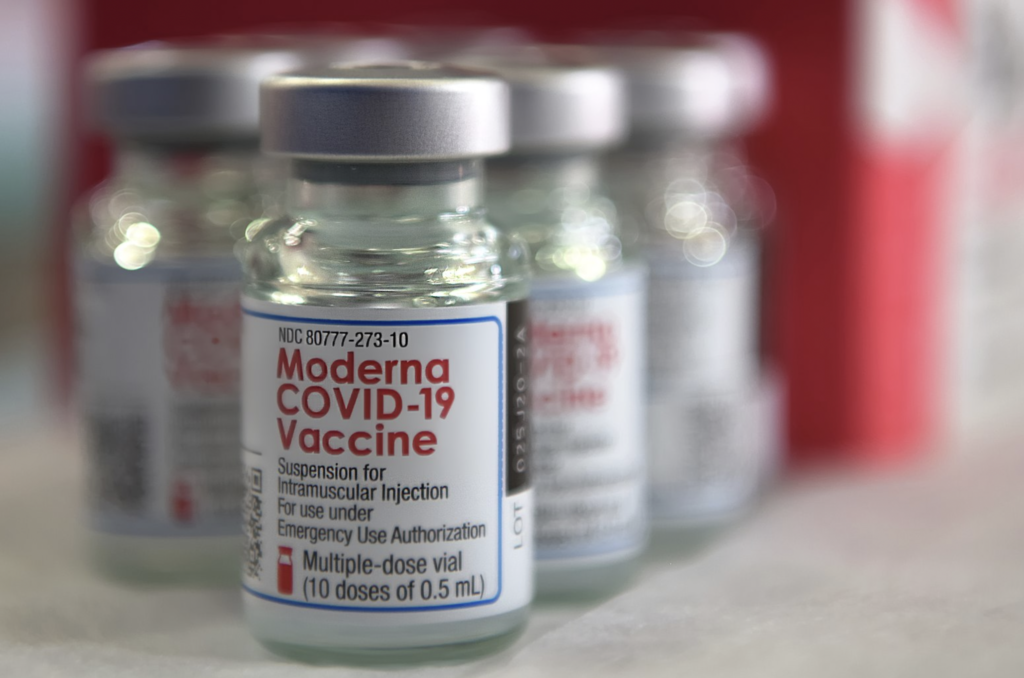
This agreement will adapt the originally agreed contractual delivery schedules. Doses originally scheduled for delivery in the summer will now be delivered in September and during the autumn and winter period 2022, when Member States will more likely need additional stocks of vaccines for national campaigns and meeting their international solidarity commitments.
The agreement also ensures that, if one or more adapted vaccines receive marketing authorisation, Member States may choose to receive those adapted vaccines under the current contract.
In this context, at the request of some Member States, the agreement also secures additional 15 million doses of Omicron-containing vaccine booster candidates from Moderna, subject to marketing authorisation within timelines that would allow the use of these doses for their vaccination campaigns.
Commissioner for Health and Food Safety, Stella Kyriakides, said: “Increasing COVID-19 vaccination and booster rates will be crucial as we plan ahead for the autumn and winter months. To best ensure our common preparedness, Member States must have the necessary tools. This includes vaccines adapted to variants, as and when they are authorised by the European Medicines Agency. This agreement will ensure that Member States will have access to the vaccine doses they need at the right time to protect our citizens”.
Background
In 2020, the European Union invested heavily in the global production of a number of COVID-19 vaccines. It was crucial to have vaccines as early as possible and at the scale needed, requiring important investments before knowing whether any of these vaccines would prove successful.
These actions taken at risk in 2020 have clearly paid off, as the development of vaccines has been highly successful: Member States had equal access to safe and effective vaccines at the earliest opportunity, and at the scale needed, allowing all EU citizens to be offered primary and booster vaccinations, saving lives and mitigating the impact of the pandemic upon social and economic life.
Moreover, a large number of these vaccines could also be used in the global efforts to tackle the pandemic. As of end July 2022, the EU exported more than 2.4 billion vaccine doses to 168 countries. Member States have shared over 478 million doses of which around 406 million have already been delivered to recipient countries (around 82% of these via COVAX). At the same time, Member States must continue to ensure they have the strategic stocks of vaccines they need to deal with the potential epidemiological evolution of the COVID-19 virus, given the uncertainties over its future evolution and impact. The EU’s Vaccines Strategy provides Member States with certainty that they will have the supply they need, including of adapted vaccines.
MONKEYPOX: EXPERTS GIVE VIRUS VARIANTS NEW NAMES
A group of global experts convened by WHO has agreed on new names for monkeypox virus variants, as part of ongoing efforts to align the names of the monkeypox disease, virus and variants – or clades – with current best practices. The experts agreed to name the clades using Roman numerals.
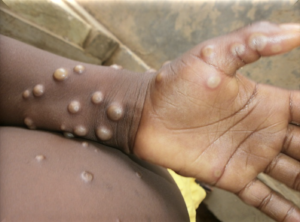
The monkeypox virus was named upon first discovery in 1958, before current best practices in naming diseases and viruses were adopted. Similarly for the name of the disease it causes. Major variants were identified by the geographic regions where they were known to circulate.
Current best practice is that newly-identified viruses, related disease, and virus variants should be given names with the aim to avoid causing offense to any cultural, social, national, regional, professional, or ethnic groups, and minimize any negative impact on trade, travel, tourism or animal welfare.
Disease: Assigning new names to existing diseases is the responsibility of WHO under the International Classification of Diseases and the WHO Family of International Health Related Classifications (WHO-FIC). WHO is holding an open consultation for a new disease name for monkeypox. Anyone wishing to propose new names can do so here (see ICD-11, Add proposals).
Virus: The naming of virus species is the responsibility of the International Committee on the Taxonomy of Viruses (ICTV), which has a process underway for the name of the monkeypox virus.
Variants/clades: The naming of variants for existing pathogens is normally the result of debate amongst scientists. In order to expedite agreement in the context of the current outbreak, WHO convened an ad hoc meeting on 8 August to enable virologists and public health experts to reach consensus on new terminology.
Experts in pox virology, evolutionary biology and representatives of research institutes from across the globe reviewed the phylogeny and nomenclature of known and new monkeypox virus variants or clades. They discussed the characteristics and evolution of monkeypox virus variants, their apparent phylogenetic and clinical differences, and potential consequences for public health and future virological and evolutionary research.
The group reached consensus on new nomenclature for the virus clades that is in line with best practices. They agreed on how the virus clades should be recorded and classified on genome sequence repository sites.
Consensus was reached to now refer to the former Congo Basin (Central African) clade as Clade one (I) and the former West African clade as Clade two (II). Additionally, it was agreed that the Clade II consists of two subclades.
The proper naming structure will be represented by a Roman numeral for the clade and a lower-case alphanumeric character for the subclades. Thus, the new naming convention comprises Clade I, Clade IIa and Clade IIb, with the latter referring primarily to the group of variants largely circulating in the 2022 global outbreak. The naming of lineages will be as proposed by scientists as the outbreak evolves. Experts will be reconvened as needed.
The new names for the clades should go into effect immediately while work continues on the disease and virus names.
STATE AID: COMMISSION APPROVES REVISED COMMITMENTS BY ITALY FOR BANCA MONTE DEI PASCHI DI SIENA
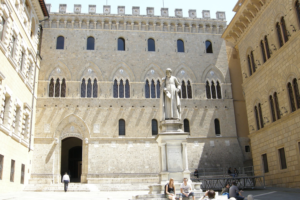
The European Commission has approved, under EU State aid rules, a set of revised commitments submitted by Italy, replacing the original commitments on the basis of which the Commission had approved a precautionary recapitalisation of Banca Monte dei Paschi di Siena (‘MPS’).
In July 2017, the Commission approved Italy’s plan to support a precautionary recapitalisation of MPS, on the basis of commitments submitted by Italy. Under these commitments, the bank had to implement specific measures to restore its long-term viability, minimise distortions of competition and ensure an adequate own contribution to cover losses and restructuring costs. These commitments were first amended in September 2019. In addition, Italy had to sell its stake in the bank by a certain deadline.
Some of the original commitments had been timely implemented. In particular, MPS has reduced its bad loans and operating costs, it has improved its risk management policies and it has also respected a range of behavioral constraints. However, in July 2022, Italy asked for more time to fulfil certain other commitments, notably to sell its stake in MPS and for MPS to implement certain divestments and to continue its restructuring through a further reduction of the staff and of the operational costs relative to the revenues. To minimise possible distortions of competition caused by the extended deadline, Italy proposed a series of additional commitments, such as certain additional disposals and divestments, additional branch closures and the continued obligation to respect certain limitations on the way it conducts business.
The Commission assessed Italy’s request under EU State aid rules, in particular the 2013 Banking Communication. The Commission concluded that: (i) the extension of the deadline to complete the restructuring of the bank and to achieve the sale of the stake of the Italian State in the bank is acceptable; and (ii) the set of revised commitments adequately counterbalances the revision of the deadline.
On this basis, the Commission concluded that the aid which Italy granted to MPS in July 2017 remains compatible with EU State aid rules, as the overall balance of the original decision was maintained and has approved the revised commitments.
Background
MPS is Italy’s fifth largest bank in terms of total assets, with a market share at national level of 6.4%. At the end of 2021, it had a total balance sheet of about €138 billion, 21,244 employees and 1,368 branches in Italy. The bank is mainly active in the retail and small and medium-sized enterprises segments, but it is also present in the wealth management and insurance businesses.
In July 2017, the Commission approved restructuring aid by Italy in favour of MPS in the amount of €5.4 billion, in the form of a precautionary recapitalisation, on the basis of an effective restructuring plan which aimed at restoring the bank’s long-term viability, whilst limiting competition distortions. In order to approve the capital injection by the Italian State, among others, MPS’s shareholders and junior creditors contributed €4.3 billion to limit the use of taxpayer money, as required by EU State aid rules. Also, the Italian State committed to dispose of its participation in the bank by a certain date. In December 2019, the Commission approved certain amendments to the original 2017 commitments submitted by Italy.
EU rules, in particular the Bank Recovery and Resolution Directive, make it possible for a State to provide capital support to a solvent bank without triggering resolution, provided that certain criteria are met. In this context, State aid can only be granted to cater for the possible capital needs of a bank that would materialise if economic conditions were to worsen (so-called “precautionary recapitalisation”). The State support also has to be temporary.
Since a precautionary recapitalisation involves the use of taxpayer money, EU State aid rules require that public funds can only be injected in a bank that is profitable in the long-term. This requires the bank to undergo in-depth restructuring with the purpose of ensuring its viability in the long term. At the same time, the bank must make efforts to mitigate competition distortions and bear part of its losses and restructuring costs itself (so-called “burden-sharing”) to minimise the amount of taxpayer money.
THE EUROPEAN INVESTMENT BANK TO SUPPORT RYVU THERAPEUTICS’ DISCOVERY, RESEARCH AND DEVELOPMENT OF NEW CANCER TREATMENTS WITH €22 MILLION

- Ryvu Therapeutics, an innovative biotech company, receives EIB financing to accelerate the development of new therapies to treat severe blood cancers and solid tumours, including further clinical development of the flagship project RVU120.
- The funding is guaranteed by the European Fund for Strategic Investments, the financial pillar of the Investment Plan for Europe.
The European Investment Bank (EIB) is providing €22 million (above 100 million polish zlotys) in financing to Ryvu Therapeutics, a Polish clinical-stage drug discovery and development company focusing on novel small molecule therapies that address unmet medical needs in oncology. The funding is being provided under the EIB’s venture debt instrument, which is tailored to the specific financing needs of high-growth innovative companies. The European Fund for Strategic Investments, part of the Investment Plan for Europe, is backing this funding with a guarantee.
The EIB’s support will help Ryvu finance its development pipeline of new cancer treatments from discovery through to clinical trials. Ultimately, Ryvu aims to address the clinical limitations of current treatments in oncology and provide patients with access to innovative therapies for haematologic and solid tumours.
EIB Vice-President Teresa Czerwińska said: “Financing projects within the field of research, development and innovation is one of the EIB’s top priorities and is especially relevant today, as the world suffers from the health crisis caused by the pandemic. Support for innovative companies like Ryvu specialising in advanced biotech research is clearly needed and we are delighted to assist this ambitious company, which has a notable drug discovery and development track record. The EIB’s investment will strengthen Ryvu Therapeutics’ research, development and innovation capacity and competitiveness for the wider social benefit.”
Innovation, research, digital economy and the development of human capital are top priorities for the EIB Group. In 2021, the EIB Group’s overall financing for innovation, digital transformation and human capital projects reached €20.7 billion worldwide, of which €1.5 billion went to Poland (up from €1.2 billion in 2020).
“We are very pleased to receive funding from the European Investment Bank, which plays such an instrumental role in providing financial support to innovation-driven companies like Ryvu that seek to develop new and potentially life-saving medicines,” said Pawel Przewiezlikowski, Chief Executive Officer of Ryvu Therapeutics. “We would like to thank the EIB for their collaboration, as this funding will help Ryvu continue to advance our clinical-stage oncology pipeline, including RVU120 in clinical development for the treatment of hematologic and solid tumours, as well as earlier stage projects.”
Valdis Dombrovskis, Executive Vice-President of the European Commission for an Economy that Works for People, said: “I welcome this investment by the EIB, backed by the Investment Plan for Europe, in Polish company Ryvu Therapeutics. It is great news for Europe’s competitiveness and its location as a research hub for innovations that change and save people’s lives. The additional funding will go towards the discovery, research and development of innovative therapeutics to treat cancer patients. This investment will also support the regional economy and create highly skilled jobs in the process.”
Ryvu Therapeutics is already one of the main employers of highly qualified researchers in the biotech field in Poland. With research and development (R&D) activities based in Kraków, the additional investment in Ryvu will contribute to the creation of new highly skilled jobs and encourage economic growth in the region.
EX CHANCELLOR GERHARD SCHRÖDER ON A FIGHT WITH HIS POLITICAL FAMILY ABOUT HIS LOST PRIVILEGES
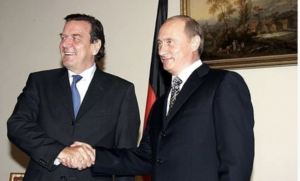
German Chancellor Olaf Scholz has urged former leader Gerhard Schröder to resign from his positions within large Russian business groups.
The ex-Chancellor has been severely criticised in Germany or close ties with Vladimir Putin.
“I don’t think it’s right for Gerhard Schröder to exercise these functions and I also think it would be right for him to step down,” said the German chancellor.
Asked whether this harms the Social Democratic Party (SPD) of which they are both members, the head of government assured: “everyone knows that we do not agree with” the positions of Gerhard Schröder concerning the Russia.
Schröder served as the chancellor of Germany from 1998 to 2005. From 1999 to 2004, he was also the Leader of the Social Democratic Party of Germany.
He has long had close ties to Mr Putin and devoted considerable attention to improving relations and economic ties with Russia. He is in fact a key proponent of the original Nord Stream project and he joined the board of the Russian energy giant Gazprom after losing Germany’s 2005 election as leader of the Social Democrats.
Controversy over Gerhard Schröder’s relationship with Russia began in 2006, when he became chairman of the shareholder committee of Gazprom’s first Nord Stream pipeline under the Baltic Sea.
Recently Gerhard Schröder has filed a lawsuit against Germany’s Bundestag, the country’s lower house of parliament, seeking to reinstate his privileges as former chancellor
The German parliament took away some of Schröder’s special rights and privileges for refusing to cut ties with Russia’s Vladimir Putin, following the invasion of Ukraine.
A German parliamentary committee ruled that he must give up his right to an office in the Bundestag, though he would continue to receive his pension and some security privileges.
In May, Schroeder announced that he would leave the supervisory board of the Russian energy giant Rosneft. He also promised to turned down a nomination for a supervisory board position at Gazprom, another Russian energy giant.
Germany’s center-left Social Democratic Party has determined that there are no grounds to expel former Chancellor Schröder over his ties to Russian companies and Russian leader Vladimir Putin. The party’s arbitration body says Schröder did not break party rules.
J.L
EUROPEAN PARLIAMENT GIVES ITS GREEN LIGHT TO EUROPEAN COMMISSION’S TAXONOMY
It was a close vote but, in the end, the European Parliament sided with the European Commission’s proposal to widen the range of financial instruments combatting Europe’s greenhouse gas emissions, and its dependency to third countries.
In essence, the proposal championed by Mairead McGuinness, EU Commissioner in charge of Financial Services, Financial Stability, and Capital Markets Union, aims to steer private investment to a mix of technologies that will contribute to climate neutrality. The approach is viewed by many as more pragmatic, given the geopolitical tensions, and with sufficient flexibility, as each member state will be able to develop its own strategy in meeting these common objectives.
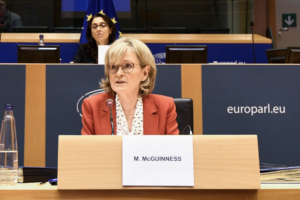
All possible solutions, based on scientific advice, are part of the menu, including incentives for private investment in gas and nuclear activities as part of our energy transition. Following, the European Parliament’s green light, these provisions will apply as of 1 January 2023.
To understand the novelty of this landmark decision, we need to go back to the start. The EU Taxonomy Regulation was adopted in June 2020 as a tool to help investors, industry, and researchers to align economic prosperity with our Green Deal objectives. The need to foster growth without harming our environment relies on the following principles: i) climate change mitigation actions, ii) climate change adaptation, iii) sustainable use of water and protection of marine resources, iv) transition to circular economy, v) pollution prevention, vi) protection and restoration of ecosystems and biodiversity. To deliver on these ideas, increased access to green finance will be made available.
The revised decision, known as the Complementary Climate Delegated Act, acknowledges the potential of other technologies contributing towards decarbonisation, and introduces clear and strict conditions for nuclear and gas activities to be added. They would need to fulfil environmental safety requirements and offer a transition from coal to renewables. Disclosure requirements also apply for businesses in the gas and nuclear energy sectors. The European Commission has amended the legal framework, so that investors can identify which investment opportunities include gas or nuclear activities.
Although fusion is part of the long-term energy mix solution, it is clear that a friendlier economic environment providing incentives, can attract more interest and investment from private and public entities in harnessing the power of the Sun. Ultimately, the energy mix of the future must include all possible options that can help us combat greenhouse gas emissions and fight climate change.

